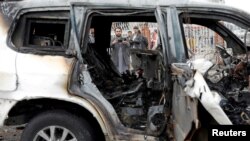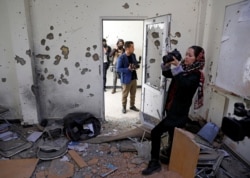A United Nations report published Monday points to a sharp increase in targeted killings of human rights defenders and journalists in Afghanistan since peace talks started between the Taliban and Afghan government last September. At least 11 rights activists and journalists have been killed in the period starting September 12.
Analyzing data from the beginning of 2018 to date, the report published by the United Nations Assistance Mission in Afghanistan, UNAMA, says there has been “a distinct change in the type of killings.”
Previously, journalists or activists mostly became victims of general attacks on the population, such as suicide blasts or other kinds of explosions.
Sometimes, journalists became victims of secondary attacks as part of their work covering the long-running conflict. In 2018, nine journalists were killed in the capital, Kabul, in one day when a suicide bomber targeted them.
The recent wave has seen an “intentional, premeditated, and deliberate targeting of individuals” that has given rise to a culture of fear.
“Human rights and media space has contracted as a result,” the report said.
Many journalists and activists report censoring themselves and toning down their words or activism. Some have quit their jobs, left home or left the country.
Unlike the past, when a militant group like the Taliban or Islamic State took responsibility, the perpetrators of these targeted killings have chosen to remain mostly anonymous.
“At a time when dialogue and an end to the conflict through talks and political settlement should be the focus, the voices from human rights and the media need to be heard more than ever before, instead, they are being silenced,” said Deborah Lyons, the secretary-general’s special representative for Afghanistan and head of UNAMA.
The report has documented 65 killings of journalists or human rights activists since 2018. Of the 25 killings since January of last year, 11 have been in the last four months.
UNAMA has called on the government of Afghanistan to ensure the safety of journalists and rights activists by putting in place proactive security measures, conducting swift and thorough investigations into killings, and bringing the perpetrators to justice under international law.
It called on non-state actors to stop killing journalists and activists, and the Taliban leadership to condemn such killings and to act against members involved in such actions.
Senior Afghan officials blame the Taliban for the targeted killings. Amrullah Saleh, the first vice president of Afghanistan, said the assassinations were part of the Taliban's "terror campaign" and linked to the peace negotiations.
"They want to break the political will of the Afg people & demand impossible concessions," he tweeted in December.
In January, Saleh tweeted that the Taliban was "targeting civil society members to weaken the voice of the Republic."
The U.S.-based Committee to Protect Journalists has listed Afghanistan as one of the most dangerous places in the world for the news media.
Meanwhile, the Taliban kidnapped 11 men, including some engineers, working on a dam in western Herat province. Sayed Wahed Qetali, the provincial governor, said that efforts were under way to secure the release of the hostages. The Taliban indicated to some local journalists that they might release the hostages in a few days.
In another development, scores of local security forces personnel died in multiple attacks around the country. Eleven police officers were killed in an insider attack, followed by a Taliban ambush in Zabul province Sunday night. Another seven were killed in a Taliban attack Sunday night in Kunduz province, authorities said.











